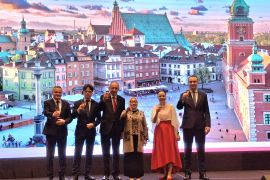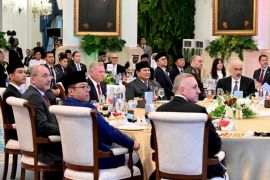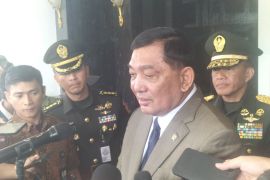By Libertina Widyamurti Ambari Jakarta (Antara) - More than two thousand intellectuals from various countries are attending a two-day international Islamic conference organized by Hizbut Tahrir Indonesia in Jakarta, a Hizbut Tahrir spokesman said on Sunday. The conference will explore a theme related to the end of capitalism and the prospect of Islamic civilization under the Khilafah. "Some international scholars, who are attending the event, belong to Algeria, Malaysia, Lebanon, the United States, Britain, Japan, Australia, and Indonesia," Ismail Yusanto stated. He pointed out that the conference was officially entitled the "Jakarta International Conference of Muslim Intellectuals" and the committee had received 140 scientific papers, which had been grouped under seven main topics. The papers mainly focus on global political change and its impact on Muslim countries, good governance challenges, economic challenges, health and food security, energy and natural resources management, women and families, as well as education and science and technology. "On the first day of discussions, we agreed that the dominant issues in these fields were not merely a technical matter, but related to each other and rooted in the separation of religion from society, political and economic life," Ismail noted. According to him, the intellectuals believed that Islam with its legal devices, such as the so called Sharia law, could provide the best solution for resolving these problems. "Thus, there must be an integration in the implementation of Islamic law under the Islamic Khilafah system" Ismail added. He further asserted that following the Khilafah, along with the Islamic law were scientific and rational ideas, not just emotional and historical matters as thought by most people across the world. "Till now, the Sharia and the Khilafah have not been explored or studied scientifically, including in Indonesia, which is the largest Muslim country globally. The Islamic system is always identified with the study of the Middle East, whereas there is no connection between these two things," Ismail clarified. He added that the conference would contemplate and deal with these global problems further, especially those being encountered by Muslim countries by formulating solutions that are based on Islamic ideas as a global life system. Several follow-up activities to the conference include publishing digital proceeding journals and books, as well as holding a campus road show. (*)
Berita Terkait

Indonesian govt assigns food SOEs to distribute Minyakita cooking oil
14 November 2025 14:51

Addressing the dilemma of thrifting
14 November 2025 13:50

RI, Poland strengthen people-to-people ties at 70th anniversary event
14 November 2025 11:30

Poland seeks stronger ties with Indonesia as 70-year relations marked
14 November 2025 10:20





